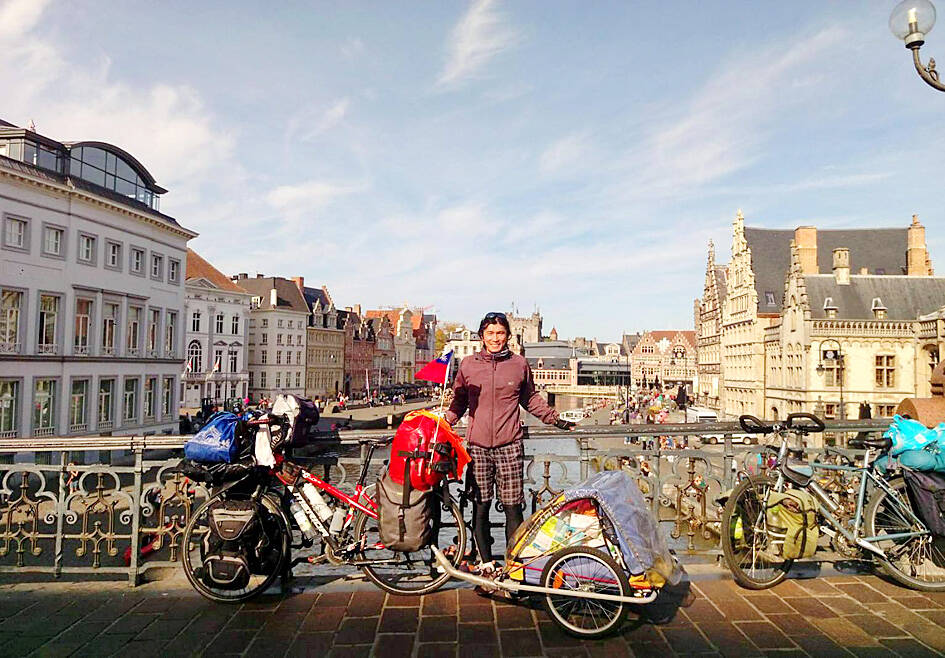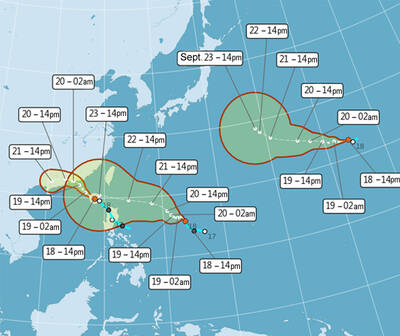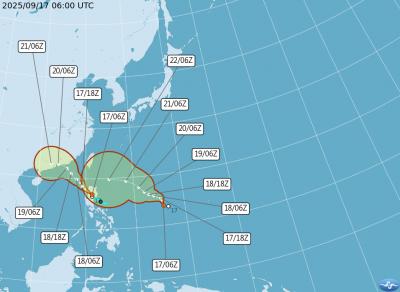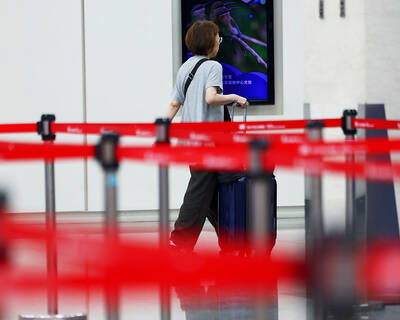Taiwanese cyclist Jacky Chen (陳峻永), who has traveled 70,000km across 89 nations with a Republic of China (ROC) flag on his bike, says his identity as a Taiwanese has shaped his journeys abroad.
In an interview in Hanoi on Sept. 4, Chen said that although he cannot officially represent Taiwan, his goal for his trip has always been “to introduce Taiwan to the world,” adding that he was inspired to make the journey to raise global awareness of Taiwan’s separate and distinct existence from China.
Chen, formerly employed as an electronic engineer in Hsinchu with an annual salary of more than NT$1 million (US$33,091), said he quit his job in 2015 after reading Japanese author Yusuke Ishida’s travelogue Don’t Go Will Die, in which Ishida described his four-year cycling journey across the world.

Photo courtesy of Jacky Chen via CNA
Chen said he had planned for a five-year journey, but the undertaking has taken double that span of time and counting.
Long-distance tours are more frequently embarked upon by Westerners, which motivated him to blaze a trail and increase the nation’s profile by accepting the challenge, he said.
“When I told others that I came from Taiwan, most people responded with warmth and friendliness, as well as curiosity about my story,” Chen said. “Just a few Cubans insisted that I came from China, but I did not argue with them.”
“I cannot represent Taiwan, and merely hope to help the world to hear about Taiwan and know that Taiwan is not the same as China,” he said.
If the people he met asked him whether Taiwan belongs to China, he told them that Taiwan’s president, passports and currency are distinct from China’s, Chen said.
“If I really have to get into it, it is closer to the fact to say that China declared independence from Taiwan, because the ROC predates the People’s Republic of China by far,” he said.
“This is similar to the relationship between the UK and the US, which has nothing to do with the difference in the nations’ power or size,” Chen said.
He said media outlets ran stories about him in several countries he visited, adding that he temporarily became a celebrity in a Mexican town after his bicycle trailer was stolen.
Local residents sympathetic to his plight started a charity drive and donated various types of necessities, he said.
The incident has since become a treasured memory, Chen said.
In 2020, he arrived in Namibia amid the local outbreak of the COVID-19 pandemic, which stranded him there.
Local Taiwanese entrepreneurs helped provide him with necessities and accommodation for six months until he could book a return flight to Taiwan, he said.
He resumed his tour following the easing of the pandemic restrictions, only to find that the word “China” on his old ROC passport had become a source of concern for COVID-wary foreign officials and residents, Chen said.
A misunderstanding occurred at the customs border of Malawi where officials barred his entrance into the nation, fearing that he had come from China, he said.
The new passport he now uses, which features the word “Taiwan” printed in bold letters on its cover, has likely helped steer him away from other misunderstandings about his nationality on many occasions, Chen said.
He said he has been treated generously throughout his journey by the strangers he met and local Taiwanese business communities, especially those in Central and South America.
“Every Taiwanese I met abroad was friendly and hospitable,” Chen said.
In Malaysia, he was struck by a car from behind, but made a full recovery with the help of local Taiwanese businesspeople, he said.
The next part of the journey — a return to East Asia — would be the last chapter of his adventure, he said.
Going eastward, Chen said he would next visit Hong Kong, Macao, and cities in southern China, then wait for spring to go to China’s Inner Mongolia and northeastern areas, and South Korea.
This part of the journey should take about a year and would take him back to Taiwan next year, if all goes according to plan, he said.

PEAK MONTHS: Data showed that on average 25 to 27 typhoons formed in the Pacific and South China seas annually, with about four forming per month in July and October One of three tropical depressions in the Pacific strengthened into a typhoon yesterday afternoon, while two others are expected to become typhoons by today, Central Weather Administration (CWA) forecaster Lee Ming-hsiang (李名翔) said yesterday. The outer circulation of Tropical Depression No. 20, now Typhoon Mitag, has brought light rain to Hualien, Taitung and areas in the south, Lee said, adding that as of 2pm yesterday, Mitag was moving west-northwest at 16kph, but is not expected to directly affect Taiwan. It was possible that Tropical Depression No. 21 would become a typhoon as soon as last night, he said. It was moving in a

A Taiwanese academic yesterday said that Chinese Ambassador to Denmark Wang Xuefeng (王雪峰) disrespected Denmark and Japan when he earlier this year allegedly asked Japan’s embassy to make Taiwan’s representatives leave an event in Copenhagen. The Danish-language Berlingske on Sunday reported the incident in an article with the headline “The emperor’s birthday ended in drama in Copenhagen: More conflict may be on the way between Denmark and China.” It said that on Feb. 26, the Japanese embassy in Denmark held an event for Japanese Emperor Naruhito’s birthday, with about 200 guests in attendance, including representatives from Taiwan. After addressing the Japanese hosts, Wang

One of two tropical depressions that formed offshore this morning could turn into a moderate typhoon by the weekend, the Central Weather Administration (CWA) said today. Tropical Depression No. 21 formed at 8am about 1,850km off the southeast coast, CWA forecaster Lee Meng-hsuan (李孟軒) said. It is expected to move in a northwesterly direction as it continues building momentum, possibly intensifying into Typhoon Mitag this weekend, she added. The radius of the storm is expected to reach almost 200km, she said. It is expected to approach southeast of Taiwan on Monday and pass through the Bashi Channel between Tuesday and Wednesday,

About nine Taiwanese are “disappeared,” detained, or otherwise deprived of freedom of movement in China each month, the Mainland Affairs Council (MAC) said yesterday. Between Jan. 1 last year and Aug. 31 this year, 188 Taiwanese travelers went missing, were detained and interrogated, or had their personal freedom restricted, with some questioned in airports or hotel lobbies, the council said. In a statement ahead of the Mid-Autumn Festival, the council urged people visiting China for any reason to be highly vigilant and aware of the risks. Of the reported cases, 50 people were “disappeared” after entering China, 19 were detained and 119 had